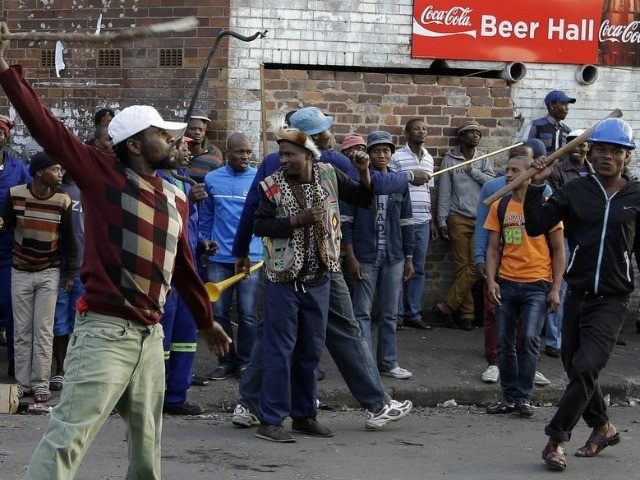South African law enforcement has arrested 198 illegal immigrants in a raid in Johannesburg, following weeks of violent attacks on known foreigners and foreigner-owned small businesses by South African natives for unspecified “criminal activity.” The number of those arrested in one night is about 100 less than the total of those arrested for participating in riots and attacks that have taken the lives of seven and caused an international firestorm against the South African government.
Police arrested 212 people following a tip of “criminal activity in the area,” a police spokesperson told AFP, 198 of whom were illegally in the country. The fact that a minority of them were legally in South Africa indicates that the criminal activity which they were investigating was not the state of being in South Africa illegally.
“The army was backing us during the raid and when we came across people without legal documents, home affairs officials screened them,” said the spokesman. Police found “a firearm, drugs, and pirated CDs” in the arrest location, reports note.
As of April 13, the government announced that it had arrested 22 people for participating in xenophobic attacks that destroyed millions in business property and killed seven. By April 20, that number had risen to 300.
The attacks appear to have done little to help immigrants living in South Africa feel safer. One family told Vice magazine they lived in such fear that they did not feel comfortable taking their son to a doctor, for fear the doctor would hurt him. “There are no reports that anything like this has happened, but a constant barrage of rumors and fake violent images have circulated social media and messaging apps like WhatsApp, stoking more fear,” explains Vice. The magazine notes that the government of President Jacob Zuma, rather than encourage South Africans to embrace foreigners entering the country, have hinted that they are a hindrance to the nation:
The African National Congress (ANC) General Secretary Gwede Mantashe accused foreign nationals of trying to destabilize South Africa’s platinum industry last year, while President Jacob Zuma told a Johannesburg audience in 2013, “don’t be like Africans and think like Africans.” A call by South Africa’s powerful Zulu King Goodwill Zwelithini in March for foreigners to “pack their bags and leave” — later supported by the president’s son, Edward Zuma, who said South Africa was “sitting on a time bomb with [foreigners] taking over” — has been blamed for sparking the recent wave of attacks.
The current wave of violence began after comments by Zulu King Goodwill Zwelithini in which he compared immigrants to “head lice” that must be removed.
The South African government declared on April 28 that the wave of xenophobic violence had subsided. “The violence has stopped,” one official declared. Following criticism from other nations whose citizens were in danger in South Africa–including the call by one Nigerian group to bring Zwelithini to the International Criminal Court for using language reminiscent of the Rwandan genocide–President Zuma remarked that those nations contribute to the violence by providing unacceptable living situations that force their citizens out.
“As much as we have a problem, our neighbouring countries contribute to this. It’s not useful to be critical of South Africa as if we mushroom these foreign nationals and then mistreat them,” Zuma said last weekend. “Everyone criticises South Africa as if we manufactured a problem. We should ask what caused the foreign nationals to be in South Africa,” he concluded.
The reaction from neighboring countries to Zuma’s remarks has not been warm. Robert Mugabe, the dictator of Zimbabwe and largely responsible for the wave of immigrants trying to reach South Africa, slammed the alleged opportunities awaiting immigrants in South Africa as a fraud. “People flock to South Africa because they think it is the heaven of Southern Africa. … Yes‚ it’s highly developed‚ but go there and see that the Africans in the country are still very low,” Mugabe said this week, accusing “the whites” in South Africa of continuing to monopolize resources.
Mugabe encouraged immigrants to “get back to their own country.”
In contrast to Zuma’s remarks, Graça Machel, widow of Nelson Mandela, has urged South Africans to react to the violence with “proportional” attempts to curb it. Machel, speaking at the funeral of Mozambican violence victim Emmanuel Sithole, said of the attacks, “We may say that in 2008 we did not know [xenophobic attacks could occur]. Now in 2015, we can no longer say we do not know. Now we know how bad it can be. Our actions have to be proportional to the deep crisis we are going through.”
A reporter of South Africa’s The Times captured on camera the beating that killed Sithole, prompting international outrage against the violence.

COMMENTS
Please let us know if you're having issues with commenting.